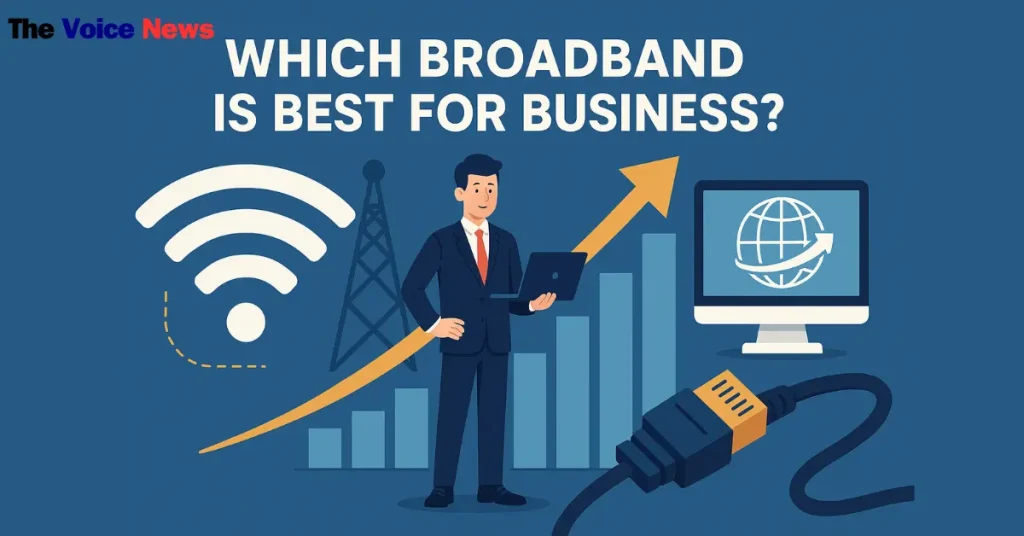In today’s fast-paced digital world, having reliable and high-speed internet is essential for every business, big or small. Whether you run an office, a retail store, or a startup from your home, your choice of broadband can dramatically impact your operations, customer satisfaction, and overall success.
But with so many broadband providers and plans available, deciding which broadband is best for business can feel overwhelming. This article breaks down everything you need to know — from understanding different connection types to considering critical factors like speed, reliability, and cost — so you can make an informed choice that fits your business needs.
Why Choosing the Right Business Broadband Matters
The internet connection your business relies on is more than just a utility; it is a backbone that supports your work, communications, cloud services, customer interactions, and even marketing efforts.
Key reasons why you need the best broadband for business:
- Consistent Performance: Downtime or slow connections can cost valuable time and money.
- Supports Multiple Devices: Modern businesses use numerous devices and applications simultaneously.
- Secure Communication: Protect sensitive company and customer data with a secure connection.
- Scalability: Choose a plan that grows with your business.
- Customer Experience: Fast and reliable internet ensures smooth service delivery and client interactions.
Types of Business Broadband Connections
Before diving into which broadband provider or plan is best, it’s essential to understand the different types of internet connections available to businesses.
1. Fiber Optic Broadband
Fiber optic internet uses thin strands of glass or plastic to transmit data as light signals. It is known for exceptionally high speeds and reliability.
Pros:
- Ultrafast speeds — often up to 1 Gbps or more
- Extremely low latency (great for video calls, cloud apps)
- High reliability with minimal outages
- Symmetrical upload and download speeds
Cons:
- Availability limited in some rural or less-developed areas
- Can be more expensive than other types
2. Cable Broadband
Cable broadband delivers internet through the same coaxial cables as cable TV. It is widely available, making it a popular choice.
Pros:
- High speeds suitable for many business needs
- Generally affordable plans
- Availability in most urban and suburban areas
Cons:
- Speeds can slow during peak usage times (shared bandwidth)
- Upload speeds typically lower than downloads
3. DSL Broadband
DSL (Digital Subscriber Line) uses telephone lines to provide internet, making it accessible virtually anywhere phone service exists.
Pros:
- Widely available, even in rural areas
- Affordable pricing
- Dedicated line, so bandwidth is not shared with neighbors
Cons:
- Slower speeds compared to fiber and cable
- Speed depends on distance from the exchange
4. Fixed Wireless Broadband
This connection uses radio signals between a fixed antenna on your premises and the provider’s tower.
Pros:
- Good option where cables are unavailable
- Relatively fast speeds
- Quick to install
Cons:
- Performance can be affected by weather and physical obstructions
- Data caps or higher costs are common
5. Satellite Broadband
Satellite internet beams signals from space to a dish installed at your business location.
Pros:
- Available anywhere with a clear view of the sky
- Useful for remote locations
Cons:
- Higher latency (delay), which can affect real-time applications
- Often has data caps and expensive plans
- Slower speeds compared to wired options
Factors to Consider When Selecting Business Broadband
Choosing the right broadband plan does not only depend on speed or price. Here are some critical factors you must evaluate:
1. Speed and Bandwidth Requirements
- Assess how many employees and devices will be online simultaneously.
- Determine your data usage needs: Are you frequently uploading/downloading large files?
- Consider planned growth — your internet needs might increase.
2. Reliability and Uptime Guarantees
- Look for providers with strong uptime guarantees (99.9% or higher).
- Check reviews or ask other businesses about downtime experiences.
- Fiber connections usually offer the highest reliability.
3. Customer Support
- Prompt, knowledgeable customer service is vital.
- Check if the provider offers 24/7 support, dedicated account managers, or on-site assistance.
4. Upload vs. Download Speeds
- If your business uses cloud services or video conferencing, upload speeds matter as much as download.
- Many broadband plans offer asymmetrical speeds (higher download, lower upload).
5. Scalability and Flexibility
- As your business grows, you may need faster speeds or more bandwidth.
- Check if the provider allows easy upgrades or flexible contracts.
6. Security Features
- Ensure the plan includes robust security options like firewalls, encryption, and DDoS protection.
- Business-grade internet often includes better security than residential plans.
7. Cost and Contract Terms
- Understand the total cost, including installation fees, equipment rental, and monthly charges.
- Look for transparent contracts without hidden fees or long lock-in periods.
Comparing Top Business Broadband Providers
While your local market options will vary, here are some business broadband provider categories to consider:
National or Global Providers
These companies offer extensive coverage and varied plan options with reliable business-grade services. Examples include major telecoms that provide fiber, cable, and DSL packages with strong SLAs (Service Level Agreements).
Regional Providers
Often smaller but very customer-focused, regional providers may offer better custom plans or pricing and personalized support.
Niche or Industry-Specific Providers
Some providers specialize in certain industries or solutions, such as tech firms needing dedicated high-speed fiber or retail businesses requiring secure payment gateways with robust connections.
Choosing Business Broadband
Startup Owner Focused on Cost and Flexibility
Jessica runs a growing tech startup with 10 employees working remotely and in-office. For her, cost and flexibility are key. She chose a cable broadband plan that offers reasonable speeds and no long-term contracts, enabling quick upgrades as her team grows. While not as fast as fiber, it fits her current budget and supports all business communications smoothly.
Law Firm Prioritizing Reliability and Security
David manages a law practice handling sensitive client data. For him, fiber optic broadband was the only choice due to its high reliability and symmetrical speeds. His provider offers enterprise-grade security features and a guaranteed uptime SLA, which gives peace of mind that confidential documents and client communications are secure and uninterrupted.
Tips to Maximize Your Business Broadband Experience
- Invest in Quality Equipment: Use professional-grade routers and firewalls designed for business.
- Regularly Monitor Usage: Track data consumption and speed performance to avoid surprises.
- Have a Backup Plan: Consider secondary connections like 4G LTE failover for emergencies.
- Train Your Team: Encourage responsible internet use to avoid bandwidth hogging.
Conclusion: Making the Smart Choice for Your Business
Selecting the best broadband for business involves weighing multiple factors — speed, reliability, cost, support, and security. By understanding the types of broadband available and evaluating your specific needs, you can choose a connection that empowers your team, enhances customer experience, and scales with your growth.
Start by assessing your current and future internet usage, explore the options available in your area, and reach out to providers for detailed plans and SLAs. Remember, the right broadband is an investment that can make a significant difference in your business performance.
Ready to take your business internet to the next level? Start today by comparing local broadband options based on your unique needs — your business depends on it!


